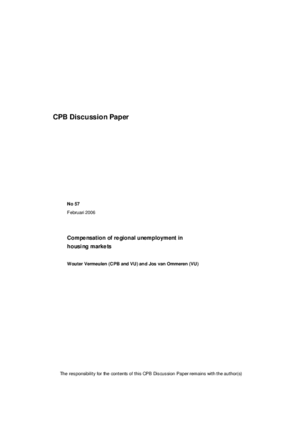Compensation of regional unemployment in housing markets
Lagere huizenprijzen compenseren voor hogere regionale werkloosheid
We are sorry, unfortunately there is no English translation of this page.
Why are regional unemployment differentials in Europe so persistent if, as the wage curve literature demonstrates, there is no compensation in labour markets?
We hypothesise that workers in high-unemployment regions are compensated in housing markets. Modelling regional unemployment differentials as a consequence of centralised wage bargaining, we show that clearing of land markets may undo the incentive for workers to migrate to low-unemployment regions in general equilibrium.
The compensating differentials hypothesis is tested on city-level data for several countries. Controlling for variation in income and amenities, housing is found to be about 3 percent less expensive on average in cities where unemployment is 10 percent up. An analysis of housing demand survey data, which takes account of housing heterogeneity, yields a similar negative relationship. The magnitude of the income effect generated by this compensating differential is consistent with a -0.10 wage curve elasticity. Workers in regions with high unemployment and low per capita income are therefore not necessarily worse off, and regional support programs should take this into account.
